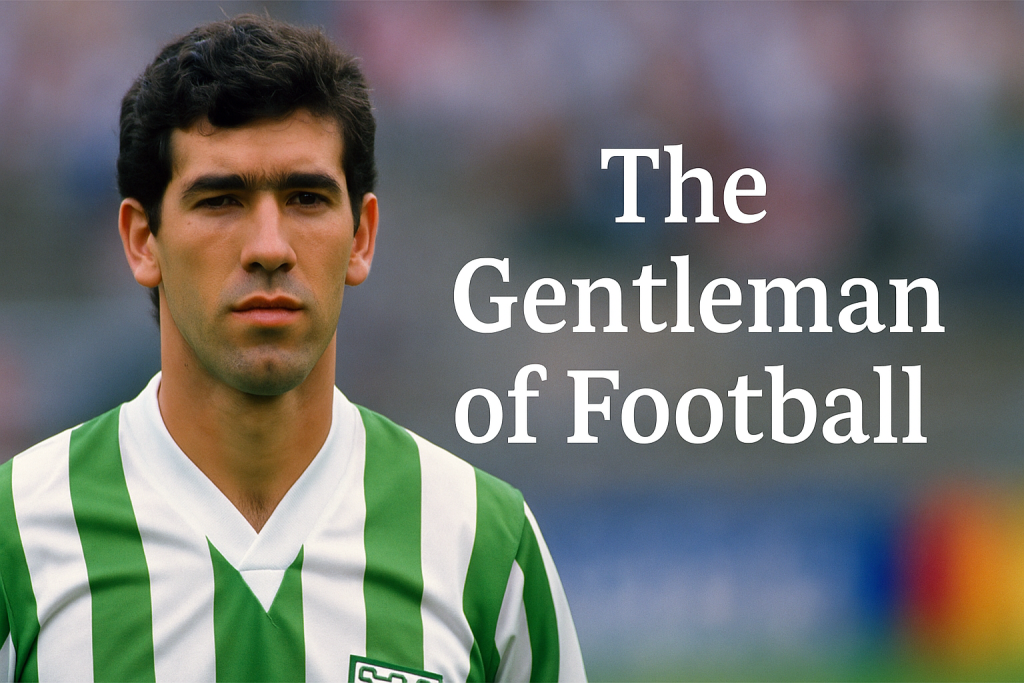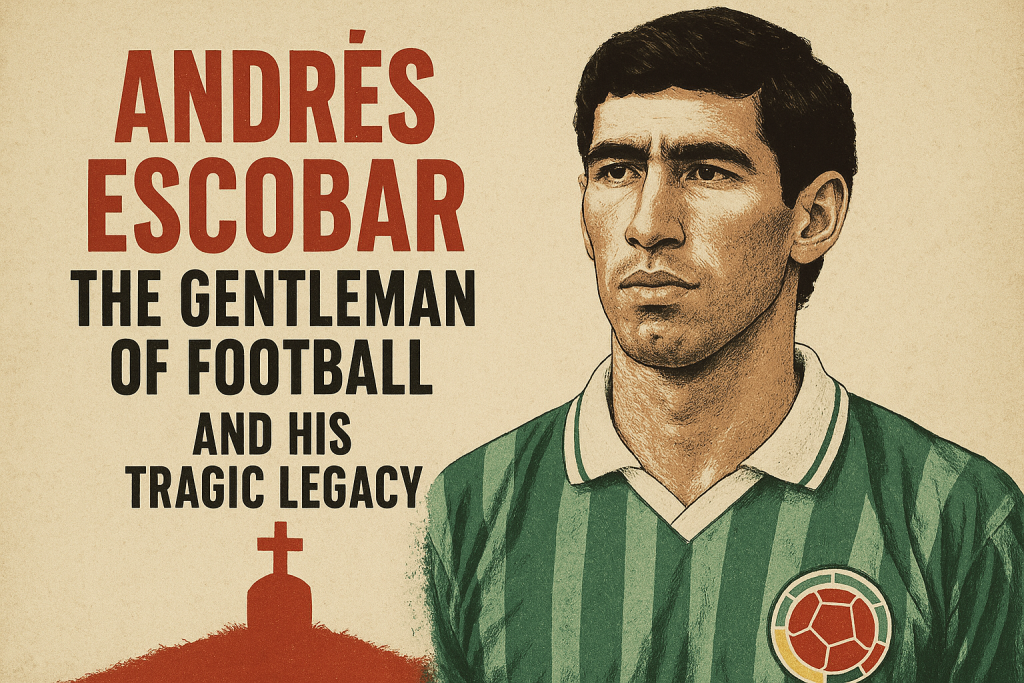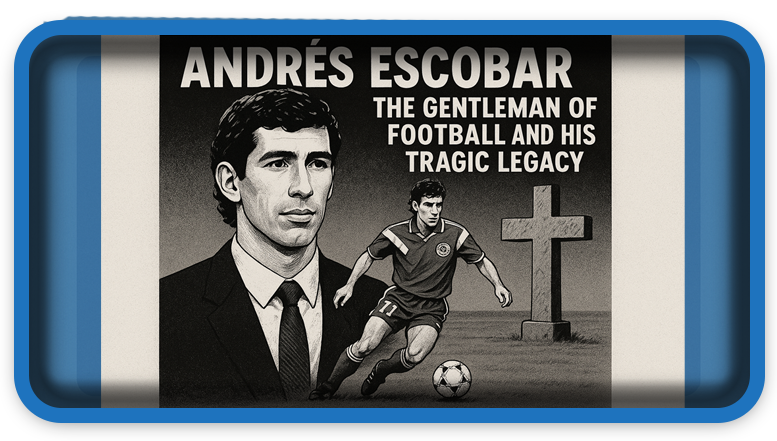⏲️ Estimated reading time: 5 min
Andrés Escobar – The Gentleman of Football and His Tragic Legacy. Andrés Escobar, the Colombian defender known as “The Gentleman of Football,” gained admiration for his skill, humility, and fair play. His tragic death in 1994, after an own goal at the World Cup, remains one of football’s darkest moments.
Who Was Andrés Escobar?
When people talk about football legends, they often recall dazzling goals and glorious victories. Yet, some names live on not just for their talent but also for the tragedies that surrounded them. One such name is Andrés Escobar, a Colombian footballer admired for his discipline and sportsmanship. Known as “El Caballero del Fútbol” (The Gentleman of Football), Escobar represented integrity in a sport often overshadowed by controversies. Sadly, his story became inseparable from one of the darkest chapters in football history.
Early Life and Rise to Fame
Born on March 13, 1967, in Medellín, Colombia, Andrés Escobar grew up during turbulent times. Political unrest and violence dominated Colombian society in the 1980s, but football gave him hope. He joined Atlético Nacional, the pride of Medellín, where he quickly rose as one of South America’s most reliable defenders.
Escobar didn’t rely on flashiness. Instead, he played with elegance, intelligence, and precision. His defensive style, marked by anticipation and clean tackling, earned him the nickname “The Gentleman.” Beyond football, he gained respect for his humility, discipline, and soft-spoken character.
Career Highlights
- Atlético Nacional: Escobar led the team to domestic success with calm leadership and defensive reliability.
- Colombian National Team: He represented Colombia in the 1990 and 1994 World Cups.
- Fair Play Advocate: Escobar’s commitment to clean play made him unique among defenders. He rarely received cards, proving that respect and discipline could coexist with competitiveness.
By the mid-1990s, European clubs had started showing interest, and many expected Escobar to move to Italy’s Serie A after the 1994 World Cup.
Colombia’s Golden Generation
In the early 1990s, Colombia seemed ready to dominate world football. With stars like Carlos Valderrama, Faustino Asprilla, and Freddy Rincón, they qualified for the 1994 World Cup in the United States. Experts believed Colombia could contend for the title.
At the same time, Colombia faced grim realities. Drug cartels had deeply infiltrated football, with mafia bosses placing enormous bets on matches. This turned the World Cup into more than just a competition it became a dangerous gamble with real-life consequences.
The 1994 World Cup and the Own Goal
On June 22, 1994, Colombia played against the United States in Los Angeles. During the match, Andrés Escobar attempted to block a cross but deflected the ball into his own net. That moment contributed to Colombia’s 2–1 defeat, which eliminated them from the tournament.
For most players, an own goal is painful but recoverable. For Escobar, it became a death sentence. The shocking exit devastated Colombia, and cartel members who had lost millions in bets directed their rage at him.

The Tragic Death of Andrés Escobar
Only ten days after the match, on July 2, 1994, Escobar went to a nightclub in Medellín with friends. Outside, men confronted him about the own goal. Escobar, calm as always, reportedly replied: “It was just a mistake. Life goes on.”
Moments later, one of the men shot him six times in the parking lot. Witnesses said the gunman mocked him by shouting “Gol!” after each shot a chilling reminder of the World Cup moment.
Escobar was rushed to the hospital, but doctors couldn’t save him. He died at just 27 years old.
Aftermath and Global Reaction
The murder of Andrés Escobar shocked the football world. Newspapers worldwide covered the tragedy, showing how football’s passion had turned deadly because of crime and corruption.
- Colombia in Mourning: Over 120,000 people attended his funeral in Medellín, honoring him as a symbol of dignity and humility.
- International Outrage: FIFA, players, and fans worldwide condemned the violence. Many called it one of football’s darkest moments.
- Justice: Humberto Muñoz Castro, a bodyguard for cartel associates, received a conviction for the murder. Still, many felt the punishment was too light compared to the crime.
Andrés Escobar’s Legacy
Although his life ended tragically, Andrés Escobar left a powerful legacy:
- Symbol of Fair Play: He remains an icon of clean, respectful football.
- Inspiration for Colombia: His death highlighted the dangerous ties between crime and sport.
- Cultural Impact: Documentaries, films, and books, such as ESPN’s “The Two Escobars”, preserve his story.
- Annual Tributes: Each year, fans and players in Medellín honor him, keeping his memory alive.
Lessons from Andrés Escobar’s Story
- The Dark Side of Passion: Football unites nations, but corruption and crime can destroy lives.
- Sportsmanship Above All: Escobar’s conduct remains a model for athletes everywhere.
- The Price of Violence: His death reminds us how fanaticism can escalate into tragedy.
Andrés Escobar’s story inspires and breaks hearts at the same time. He embodied respect, humility, and dedication but fell victim to forces outside his control. His life and death remain a lasting symbol a call for peace, fairness, and humanity in a world where passion should never turn into violence.

🔔 For more tutorials like this, consider subscribing to our blog.
📩 Do you have questions or suggestions? Leave a comment or contact us!
🏷️ Tags: Andrés Escobar, Colombian football, 1994 World Cup, Atlético Nacional, FIFA history, football tragedies, sportsmanship, Pablo Escobar era, Colombian history, fair play
📢 Hashtags: #AndresEscobar, #ColombianFootball, #WorldCup1994, #FootballHistory, #AtléticoNacional, #Sportsmanship, #FairPlay, #FootballTragedy, #Colombia, #TheGentlemanOfFootball
Only logged-in users can submit reports.
Discover more from HelpZone
Subscribe to get the latest posts sent to your email.

